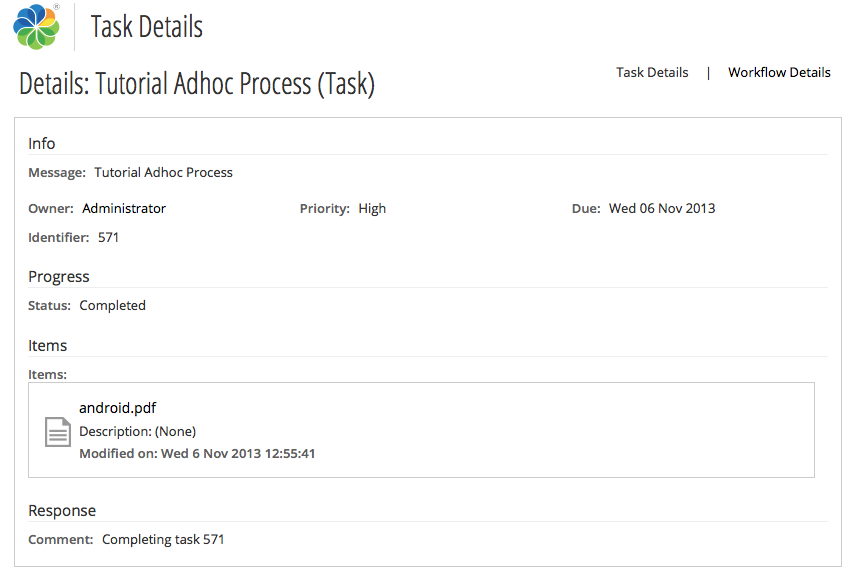This tutorial shows you how to complete a workflow task.
This tutorial assumes you are familiar with the content of previous tutorials. It also assumes that you are using Eclipse.
Once a workflow process has been started, you may want to complete all or some of
the tasks within it using the API. This tutorial shows you how that can be achieved. The
code presented here builds on that developed in the tutorial Starting a new
workflow. Once a process has been created, it is saved in a variable
adhocProcess for future use. A list of processes is then displayed
for debugging purposes. All tasks associated with a specific process are then retrieved,
and one by one these are completed with a suitable closing comment. There are many ways
to approach this problem, and this tutorial shows one of the simpler methods, in order
to get you started quickly.
-
Replace the code you developed in the tutorial Starting a new
workflow with that shown here:
package com.alfresco.tutorials.workflowtest; import java.io.Serializable; import java.util.ArrayList; import java.util.Calendar; import java.util.GregorianCalendar; import java.util.HashMap; import java.util.List; import java.util.Map; import org.alfresco.mobile.android.api.constants.WorkflowModel; import org.alfresco.mobile.android.api.exceptions.AlfrescoSessionException; import org.alfresco.mobile.android.api.model.Document; import org.alfresco.mobile.android.api.model.Person; import org.alfresco.mobile.android.api.model.ProcessDefinition; import org.alfresco.mobile.android.api.model.Task; import org.alfresco.mobile.android.api.services.WorkflowService; import org.alfresco.mobile.android.api.session.RepositorySession; import org.alfresco.mobile.android.api.utils.DateUtils; import org.alfresco.mobile.android.api.model.Process; import android.app.Activity; import android.os.AsyncTask; import android.os.Bundle; import android.util.Log; import android.widget.Toast; public class MainActivity extends Activity { @Override public void onCreate(Bundle savedInstanceState) { super.onCreate(savedInstanceState); setContentView(R.layout.activity_main); // Modify to suit your SkyVault server installation String url = "http://localhost:8080/alfresco"; String username = "admin"; String password = "admin"; new ConnectToRepo().execute(url, username, password); } class ConnectToRepo extends AsyncTask<String, Integer, String> { private static final String TAG = "ConnectToRepo"; protected static final String DESCRIPTION = "Tutorial Adhoc Process"; private WorkflowService workflowService; @Override protected String doInBackground(String... params) { Log.d(TAG, "doInBackground"); Log.d(TAG, params[0] + ":" + params[1] + ":" + params[2]); String url = params[0]; String username = params[1]; String password = params[2]; try { // connect to on-premise repo RepositorySession session = RepositorySession.connect(url, username, password); if (session != null) { // Get WorkflowService workflowService = session.getServiceRegistry() .getWorkflowService(); // start an adhoc workflow Map<String, Serializable> variables = new HashMap<String, Serializable>(); // Process Definition String processDefinitionIdentifier = "activitiAdhoc:1:4"; ProcessDefinition adhoc = workflowService .getProcessDefinition(processDefinitionIdentifier); // Assignee Person user = session.getServiceRegistry() .getPersonService() .getPerson(session.getPersonIdentifier()); List<Person> users = new ArrayList<Person>(); users.add(user); // Items - Attachments String sampleDocumentName = "android.pdf"; Document doc = (Document) session.getServiceRegistry() .getDocumentFolderService() .getChildByPath(sampleDocumentName); Log.d(TAG, "sample document id: " + doc.getIdentifier()); List<Document> docs = new ArrayList<Document>(); docs.add(doc); // Due date GregorianCalendar calendar = new GregorianCalendar(); calendar.set(Calendar.YEAR, 2013); variables.put(WorkflowModel.PROP_WORKFLOW_DUE_DATE, DateUtils.format(calendar)); // Priority variables.put(WorkflowModel.PROP_WORKFLOW_PRIORITY, WorkflowModel.PRIORITY_HIGH); // Description variables.put(WorkflowModel.PROP_WORKFLOW_DESCRIPTION, DESCRIPTION); // Notification variables.put(WorkflowModel.PROP_SEND_EMAIL_NOTIFICATIONS, "true"); // START THE PROCESS Process adhocProcess = workflowService.startProcess(adhoc, users, variables, docs); Log.d(TAG, "process identifier for newly started process: "+adhocProcess.getIdentifier()); // show a list of all processes List<Process> processes = workflowService.getProcesses(); for (Process process : processes){ Log.d(TAG, "process identifier: "+process.getIdentifier()); } // set up closing comment String comment = "Completing task "; Map<String, Serializable> vars = new HashMap<String, Serializable>(); // find task(s) to complete List<Task> tasks = workflowService.getTasks(adhocProcess); // for each task for (Task task : tasks) { // set up comment and/or other variables as required comment = comment + task.getIdentifier(); vars.put(WorkflowModel.PROP_COMMENT, comment); Log.d(TAG, comment); // Close Active Task workflowService.completeTask(task, vars); } } else { Log.d(TAG, "No Session available!"); } } catch (AlfrescoSessionException e) { Log.e(TAG, "Failed to connect: " + e.toString()); } Log.d(TAG, "doInBackground Complete"); return "doInBackground Complete"; } @Override protected void onPostExecute(String result) { super.onPostExecute(result); Log.d(TAG, "onPostExecute"); Toast.makeText(MainActivity.this, result, Toast.LENGTH_LONG).show(); } @Override protected void onProgressUpdate(Integer... values) { super.onProgressUpdate(values); Log.d(TAG, "onProgressUpdate"); } } } - Run the project and observe the output in LogCat. Take particular note of the ID of any task completed.
- In SkyVault Share, click on Tasks My Tasks in the main menubar.
- In the tasks filter on the left hand side, click Completed to display only completed tasks.
-
Click on the last item in the list (if there is more than one task showing) -
this is the task you just completed. You can also check that the ID corresponds
to the ID of a task the code just completed.
You will see something similar to the following:

- Check that the task status is Completed. Also check the comment you added programmatically is as expected according to the code.
In this tutorial you have seen how to use the new Workflow API added in version 1.3
of the SDK to complete a workflow task. Subsequent tutorials will investigate further
parts of the Workflow API.
